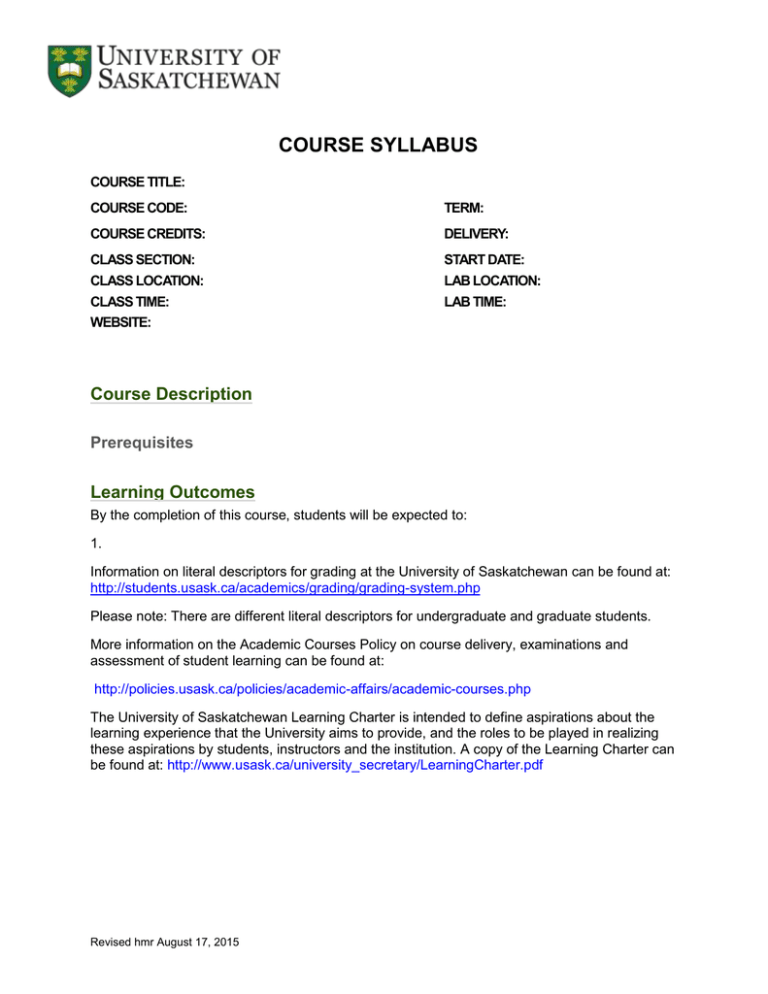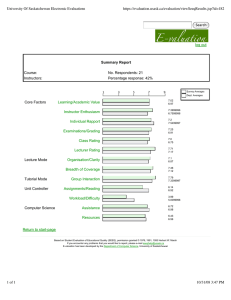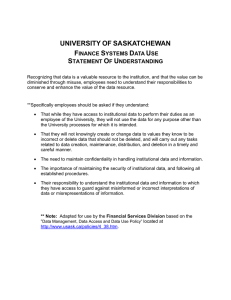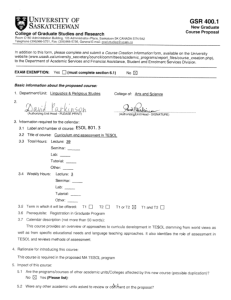COURSE SYLLABUS
advertisement

COURSE SYLLABUS COURSE TITLE: COURSE CODE: TERM: COURSE CREDITS: DELIVERY: CLASS SECTION: START DATE: CLASS LOCATION: LAB LOCATION: CLASS TIME: LAB TIME: WEBSITE: Course Description Prerequisites Learning Outcomes By the completion of this course, students will be expected to: 1. Information on literal descriptors for grading at the University of Saskatchewan can be found at: http://students.usask.ca/academics/grading/grading-system.php Please note: There are different literal descriptors for undergraduate and graduate students. More information on the Academic Courses Policy on course delivery, examinations and assessment of student learning can be found at: http://policies.usask.ca/policies/academic-affairs/academic-courses.php The University of Saskatchewan Learning Charter is intended to define aspirations about the learning experience that the University aims to provide, and the roles to be played in realizing these aspirations by students, instructors and the institution. A copy of the Learning Charter can be found at: http://www.usask.ca/university_secretary/LearningCharter.pdf Revised hmr August 17, 2015 Course Name Here University of Saskatchewan Grading System (for undergraduate courses) Exceptional (90-100) A superior performance with consistent evidence of a comprehensive, incisive grasp of the subject matter; an ability to make insightful critical evaluation of the material given; an exceptional capacity for original, creative and/or logical thinking; an excellent ability to organize, to analyze, to synthesize, to integrate ideas, and to express thoughts fluently. Excellent (80-90) An excellent performance with strong evidence of a comprehensive grasp of the subject matter; an ability to make sound critical evaluation of the material given; a very good capacity for original, creative and/or logical thinking; an excellent ability to organize, to analyze, to synthesize, to integrate ideas, and to express thoughts fluently. Good (70-79) A good performance with evidence of a substantial knowledge of the subject matter; a good understanding of the relevant issues and a good familiarity with the relevant literature and techniques; some capacity for original, creative and/or logical thinking; a good ability to organize, to analyze and to examine the subject material in a critical and constructive manner. Satisfactory (60-69) A generally satisfactory and intellectually adequate performance with evidence of an acceptable basic grasp of the subject material; a fair understanding of the relevant issues; a general familiarity with the relevant literature and techniques; an ability to develop solutions to moderately difficult problems related to the subject material; a moderate ability to examine the material in a critical and analytical manner. Minimal Pass (50-59) A barely acceptable performance with evidence of a familiarity with the subject material; some evidence that analytical skills have been developed; some understanding of relevant issues; some familiarity with the relevant literature and techniques; attempts to solve moderately difficult problems related to the subject material and to examine the material in a critical and analytical manner which are only partially successful. Failure <50 An unacceptable performance Page 2 of 7 Course Name Here Course Overview Class Schedule Week Module Readings Evaluation Due Date FINAL EXAM Midterm and Final Examination Scheduling Midterm and final examinations must be written on the date scheduled. Final examinations may be scheduled at any time during the examination period (INSERT FIRST AND LAST DAY OF CURRENT EXAM PERIOD); students should therefore avoid making prior travel, employment, or other commitments for this period. If a student is unable to write an exam through no fault of his or her own for medical or other valid reasons, documentation must be provided and an opportunity to write the missed exam may be given. Students are encouraged to review all examination policies and procedures: http://students.usask.ca/academics/exams.php Length and Mode of Final Examination Instructor Information Contact Information Office Hours Instructor Profile Page 3 of 7 Course Name Here Required Activities Outside of Class Time THIS WOULD INCLUDE THE MIDTERM AS WELL AS OTHER ACTIVITIES Required Resources Readings/Textbooks Textbooks are available from the University of Saskatchewan Bookstore: www.usask.ca/consumer_services/bookstore/textbooks Other Required Materials Electronic Resources Downloads Supplementary Resources Grading Scheme Total 100% Evaluation Components Assignment 1: Name of Assignment 1 Value: xx% of final grade Due Date: See Course Schedule Type: Brief (1-2 sentences) description of how the assignment relates to the course. Description: Detailed description of assignment expectations and procedures. Participation (Discussion Forums for online classes) Value: Due Date: xx% of final grade See Course Schedule Page 4 of 7 Course Name Here Type: Brief (1-2 sentences) description of how the Discussions relate to the course. Description: Detailed description of Discussion expectations and procedures. Midterm Exam Value: xx% of final grade Date: See Course Schedule Length: ___ hours Type: Comprehensive? Invigilated? Open book? Take home, etc. Description: Details about the type of exam questions, etc. Calculators or other electronic devices allowed or not? Final Exam Value: xx% of final grade Date: See Course Schedule Length: ___ hours Type: Comprehensive? Invigilated? Open book? Take home, etc. Description: Details about the type of exam questions, etc. Calculators or other electronic devices allowed or not? Submitting Assignments Late Assignments Criteria That Must Be Met to Pass INCLUDING IF ANY PARTICULAR OR ALL ASSIGNMENTS ARE NEEDED TO PASS Attendance Expectations Participation Experiential Learning ARE THERE ANY EXPERIENCIAL LEARNING ASPECTS OF THE COURSE AND HOW WILL THEY BE MONITORED AND EVALUATED. Page 5 of 7 Course Name Here Recording of the Course WILL THE INSTRUCTOR BE RECORDING THE COURSE? ARE STUDENTS ALLOWED OR PROHIBITED FROM RECORDING THE COURSE? Copyright HOW DOES IT RELATE TO THE COURSE? Student Feedback HOW WILL THE INSTRUCTOR USE FORMATIVE AND SUMMATIVE FEEDBACK FROM THE STUDENTS? Integrity Defined (from the Office of the University Secretary) The University of Saskatchewan is committed to the highest standards of academic integrity and honesty. Students are expected to be familiar with these standards regarding academic honesty and to uphold the policies of the University in this respect. Students are particularly urged to familiarize themselves with the provisions of the Student Conduct & Appeals section of the University Secretary Website and avoid any behavior that could potentially result in suspicions of cheating, plagiarism, misrepresentation of facts and/or participation in an offence. Academic dishonesty is a serious offence and can result in suspension or expulsion from the University. All students should read and be familiar with the Regulations on Academic Student Misconduct (http://www.usask.ca/secretariat/student-conduct-appeals/StudentAcademicMisconduct.pdf) as well as the Standard of Student Conduct in Non-Academic Matters and Procedures for Resolution of Complaints and Appeals (http://www.usask.ca/secretariat/student-conductappeals/StudentNon-AcademicMisconduct.pdf) For more information on what academic integrity means for students see the Student Conduct & Appeals section of the University Secretary Website at: http://www.usask.ca/secretariat/studentconduct-appeals/forms/IntegrityDefined.pdf Page 6 of 7 Course Name Here Examinations with Disability Services for Students (DSS) Students who have disabilities (learning, medical, physical, or mental health) are strongly encouraged to register with Disability Services for Students (DSS) if they have not already done so. Students who suspect they may have disabilities should contact DSS for advice and referrals. In order to access DSS programs and supports, students must follow DSS policy and procedures. For more information, check http://students.usask.ca/health/centres/disability-services-for-students.php, or contact DSS at 966-7273 or dss@usask.ca. Students registered with DSS may request alternative arrangements for mid-term and final examinations. Students must arrange such accommodations through DSS by the stated deadlines. Instructors shall provide the examinations for students who are being accommodated by the deadlines established by DSS. Student Supports Student Learning Services Student Learning Services (SLS) offers assistance to U of S undergrad and graduate students. For information on specific services, please see the SLS web site https://www.usask.ca/ulc/. Student and Enrolment Services Division The Student and Enrolment Services Division (SESD) focuses on providing developmental and support services and programs to students and the university community. For more information, see the SESD web site http://www.usask.ca/sesd/. College Supports OTHER SUPPORTS OFFERED BY THE COLLEGE OR DEPARTMENT Acknowledgements Course Contributor(s) Page 7 of 7


